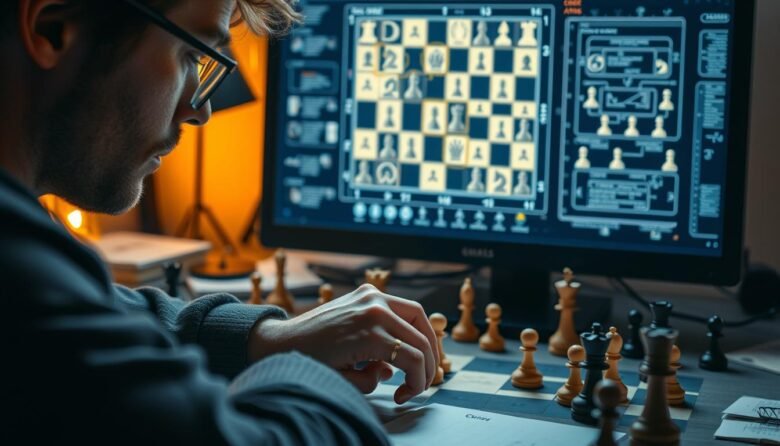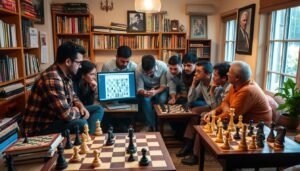Improving at chess means analyzing your games. This helps you find your mistakes and improve your strategy. It’s a key step in becoming better at the game.
Learning from mistakes helps you grow. It lets you see where you went wrong and how to do better next time. This way, you keep getting better and better at chess.
The Importance of Analyzing Chess Games
Analyzing chess games is key for players wanting to get better. It helps them see their mistakes and work on their weaknesses. This way, they can improve their techniques and understand their game better.
Understanding Mistakes and Weaknesses
Players find mistakes in their games by analyzing them. Knowing these mistakes helps them avoid them in the future. They can then focus on improving specific areas, making their game stronger.
Enhancing Strategic Thinking
Good strategic thinking is essential in chess. Analyzing games helps players think about their decisions. They learn what worked and what didn’t, leading to better tactics in future games. This helps them play more dynamically.
Measuring Progress Over Time
Tracking progress is important for chess players. By analyzing games over time, they can see how they’ve grown. They can spot patterns of success and areas to work on, guiding them towards mastery.
Basic Principles of Game Analysis
Learning the basics of chess game analysis can really boost a player’s skills. It helps them make better decisions and spot important moments in the game. By looking at how the game starts and ends, players can see their strengths and weaknesses.
Focus on Key Moments
Key moments in chess can change the game’s outcome. Players should find these critical points to understand their choices. By studying these moments, they can find patterns and improve their game.
Evaluate Opening Choices
The start of the game is crucial. Players should check if their first moves fit with known strategies. This helps them find and fix weaknesses, making their opening stronger for the next game.
Factors in Endgame Analysis
Good endgame analysis is key to winning. Players need to think about piece activity, pawn structure, and king position. By focusing on these, they can get better at the endgame and win more games.
Tools for Analyzing Chess Games
In chess, analyzing games well can really boost your skills. There are many tools to help, like chess software and online platforms. These tools make understanding games better and improve your strategy.
Chess Software and Applications
Chess software lets you explore your games in detail. Programs like ChessBase and Komodo have cool features for deep analysis. You can try out different moves and get better with practice.
Online Game Analysis Platforms
Online chess analysis makes reviewing games easy. Sites like Lichess and Chess.com let you upload games for detailed checks. They have tools to help you see your strengths and weaknesses clearly.
Using Chess Engines Effectively
Using chess engines can really help you understand tactics. Engines like Stockfish give precise feedback and suggest the best moves. This way, you can think more strategically and get better at analyzing games.
How to Review Your Games
Reviewing games is key for chess players to grow. A good method helps understand wins and losses. It also boosts performance.
Taking Notes After Each Game
Write down your thoughts right after each game. This helps catch your emotional reactions and strategic choices. It’s a way to document and analyze your games.
Identifying Patterns in Play
Spotting patterns in games is crucial for getting better. By carefully examining past games, you can find common mistakes or winning moves. This helps shape your strategy for the next game.
Asking for Feedback from Peers
Getting feedback from others is important. It brings different views and helps spot areas for improvement. Talking about your moves and results can deepen your understanding.
Analyzing Opponents’ Strategies
Understanding and adapting to opponents’ strategies is key in chess. Doing competitive chess analysis can really boost your game. Looking at a rival’s game can give you insights that make your game better.
Recognizing Common Tactics
Spotting common tactics is a strong start for building your game. Players often use moves like forks, pins, and skewers. By reviewing chess tactics, you can spot these moves and guess what your opponent will do next.
Studying Their Openings
Looking at the openings your opponents choose is crucial. By analyzing their moves, you can plan counter-strategies. This helps you stay ahead in chess analysis.
Learning from Their Mistakes
Looking at games to find your opponents’ mistakes is helpful. It shows you what strategies work. This way, you can improve your game and get better at chess.
The Role of Annotating Your Games
Annotating chess games is key to self-assessment and growth. By looking back at games through detailed notes, players can understand their choices better. This is especially true when personal thoughts are shared, showing how players think and feel during key moments.
What to Include in Annotations
An effective annotation should cover a few important points:
- Thoughts on crucial moves that shaped the game’s result.
- Breakdown of tactical choices made during the game.
- Exploration of other strategies that might have worked better.
Benefits of Personal Commentary
Personal commentary brings many benefits:
- It helps understand personal mistakes better.
- It builds a personal connection with the game.
- It encourages a reflective mindset, improving future play.
How to Structure Your Annotations
Organizing your notes clearly makes reviewing easier. Here’s a good way to do it:
- Organize notes in the order of the game’s progression.
- Mark important moves with your thoughts on them.
- Sum up what you learned after you’ve reviewed everything.
Focus on Specific Game Phases
Every chess game has different phases, each needing its own strategy. By studying each phase, players can improve their game. Knowing the opening, middle, and endgame helps players use the right tactics.
Opening Phase Analysis
The opening phase is key to setting up a strong start. Good opening moves include controlling the center and moving pieces quickly. Players should remember:
- Developing knights and bishops early
- Controlling the center squares
- Avoiding unnecessary pawn moves
Middle Game Strategies
In the middle game, players start to attack and plan. Important middle game tactics include:
- Recognizing threats from the opponent
- Identifying weak spots in the opponent’s position
- Creating potential tactical opportunities for pawn promotions
Final Moves in Endgame Scenarios
The endgame is all about precision and strategy. Players must use their earlier advantages and coordinate their pieces well. Key endgame strategies include:
- King activity and its central role
- Understanding basic checkmating methods
- Utilizing pawns effectively for advancement
Common Mistakes to Look For
Spotting common mistakes is key for any chess player wanting to get better. This part talks about the main errors that happen during games. It covers tactical oversights, strategic mistakes, and time management issues that can slow you down.
Tactical Oversights
Tactical oversights happen when players miss immediate threats or chances on the board. Not seeing a simple fork, skewers, or pins can cause big losses. It’s important to always watch the board for threats from both sides to avoid these mistakes.
Strategic Blunders
Strategic blunders are poor choices that can lead to bad trades or openings. Players often misunderstand the importance of piece activity versus pawn structure. Learning from these mistakes can improve your strategic thinking and help make better decisions.
Poor Time Management
Managing time well in chess is essential. Players need to use their thinking time wisely throughout the game. Making quick decisions because of time pressure can lead to mistakes. Creating a plan for time management can help avoid hasty moves and enhance your game.
Creating a Regular Analysis Routine
Creating a regular analysis routine is key for improving chess skills. By regularly reviewing games, players can spot mistakes and get better over time.
Setting Aside Time for Review
Setting aside time to review past games is crucial. This dedicated time helps focus on important moves, errors, and strategic mistakes. The more you do it, the more natural it becomes, helping you stay disciplined.
Pairing with Chess Puzzles
Adding chess puzzles to your routine makes analysis fun. Solving puzzles sharpens your tactical skills, leading to better game performance. It bridges the gap between knowing theory and applying it in games.
Tracking Improvement Over Time
Tracking your chess progress is important. Keeping records of your game analyses and puzzle solutions shows your growth. Seeing your improvement motivates you and shows the value of regular analysis.
Lessons from Professional Players
Learning from top players is incredibly valuable. It teaches us about chess strategies and techniques. Watching how experts play helps us learn a lot.
Every game is like a treasure chest of knowledge. It shows us advanced tactics and common mistakes to avoid.
Analyzing Renowned Games
Studying famous games teaches us about high-level decision-making. Watching grandmasters play reveals deep strategic elements. These insights help us improve our own game.
It helps us understand the moves and counter-moves of competitive play. This deepens our understanding of the game.
Learning from Grandmasters
Learning from grandmasters is especially helpful. They show us how to think ahead and adapt in games. Their moves might seem obvious later, but they’re not always easy to see.
By studying their strategies, we can improve our critical thinking. We learn to approach different parts of the game in a more sophisticated way.
Applying Insights to Your Play
Using what we learn from top players can change our game. Adopting strategies from famous matches helps us grow. It makes us better and more competitive.
This way of learning supports our ongoing improvement. It helps us stay ahead in future games.
The Psychological Aspects of Game Analysis
In chess, knowing the psychological side can really help a player. It’s key to handle frustration from mistakes well. Players should see mistakes as chances to get better, not as failures.
By thinking this way, players stay positive. They learn and grow, not get discouraged.
Handling Frustration from Mistakes
Managing emotions during analysis is important. Players should reflect on their mistakes and see the good in them. This turns negative feelings into lessons, making them stronger and more flexible in games.
Staying Motivated Through Analysis
To improve at chess, staying motivated is crucial. Seeing challenges as chances to grow keeps players excited. This mindset helps them understand and master the game better.
Building Confidence with Review
Regularly reviewing games boosts confidence in chess. Players learn from their strengths and patterns. This builds their self-confidence.
Regular analysis creates a cycle of learning. It helps players face future games with more confidence and pride.




